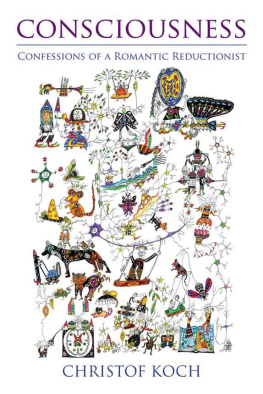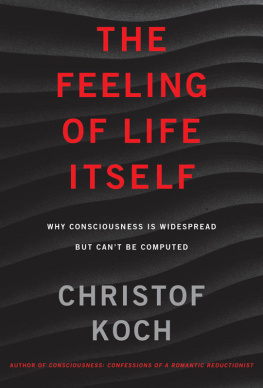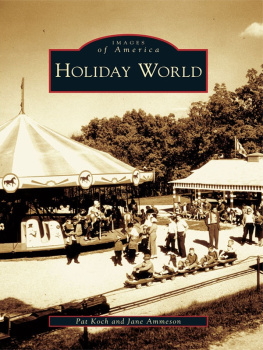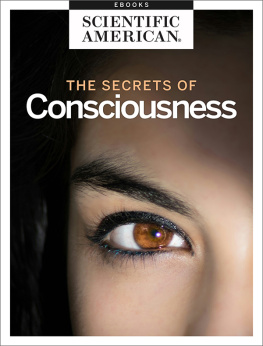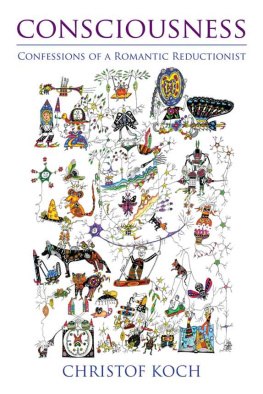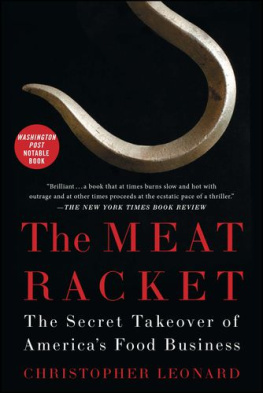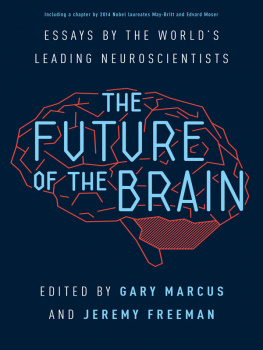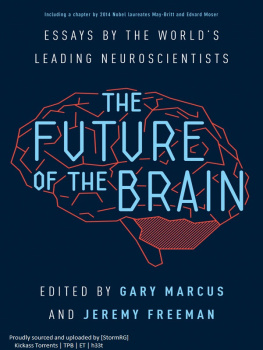Consciousness
Consciousness
Confessions of a Romantic Reductionist
Christof Koch
The MIT Press
Cambridge, Massachusetts
London, England
2012 Massachusetts Institute of Technology
All rights reserved. No part of this book may be reproduced in any form by any electronic or mechanical means (including photocopying, recording, or information storage and retrieval) without permission in writing from the publisher.
For information about special quantity discounts, please email .
Library of Congress Cataloging-in-Publication Data
Koch, Christof, 1956
Consciousness : confessions of a romantic reductionist / Christof Koch.
p. cm.
Includes bibliographical references and index.
ISBN 978-0-262-01749-7 (hardcover : alk. paper)
ISBN 978-0-262-30103-9 (retail e-book)
1. Consciousness. 2. Mind and body. 3. Free will and determinism. 4. Life. I. Title.
B808.9.K63 2012
153dc23
2011040572
10 9 8 7 6 5 4 3 2 1
To Hannele
Contents
: In which I introduce the ancient mindbody problem, explain why I am on a quest to use reason and empirical inquiry to solve it, acquaint you with Francis Crick, explain how he relates to this quest, make a confession, and end on a sad note
: In which I write about the wellsprings of my inner conflict between religion and reason, why I grew up wanting to be a scientist, why I wear a lapel pin of Professor Calculus, and how I acquired a second mentor late in life
: In which I explain why consciousness challenges the scientific view of the world, how consciousness can be investigated empirically with both feet firmly planted on the ground, why animals share consciousness with humans, and why self-consciousness is not as important as many people think it is
: In which you hear tales of scientist-magicians that make you look but not see, how they track the footprints of consciousness by peering into your skull, why you don't see with your eyes, and why attention and consciousness are not the same
: In which you learn from neurologists and neurosurgeons that some neurons care a great deal about celebrities, that cutting the cerebral cortex in two does not reduce consciousness by half, that color is leached from the world by the loss of a small cortical region, and that the destruction of a sugar cubesized chunk of brain stem or thalamic tissue leaves you undead
: In which I defend two propositions that my younger self found nonsenseyou are unaware of most of the things that go on in your head, and zombie agents control much of your life, even though you confidently believe that you are in charge
: In which I throw caution to the wind, bring up free will, Der Ring des Nibelungen, and what physics says about determinism, explain the impoverished ability of your mind to choose, show that your will lags behind your brain's decision, and that freedom is just another word for feeling
: In which I argue that consciousness is a fundamental property of complex things, rhapsodize about integrated information theory, how it explains many puzzling facts about consciousness and provides a blueprint for building sentient machines
: In which I outline an electromagnetic gadget to measure consciousness, describe efforts to harness the power of genetic engineering to track consciousness in mice, and find myself building cortical observatories
: In which I muse about final matters considered off-limits to polite scientific discourse: to wit, the relationship between science and religion, the existence of God, whether this God can intervene in the universe, the death of my mentor, and my recent tribulations
Preface
What youre holding in your hand is a slim exposition on the modern science of consciousness. Within the space of a few hours, you can inform yourself about where we natural scientists stand with respect to unraveling one of the central questions of our existencenamely, how do subjective feelings, how does consciousness, enter into the world? Through your head is the obvious answer. But that answer is not very helpful. What is it about the brain inside your head that makes you conscious of colors, of pain and pleasure, of the past and of the future, of yourself and of others? And does any brain suffice? What about the brain of a comatose patient, of a fetus, of a dog, a mouse, or a fly? What about the brains of computers? Can they ever be conscious? Ill tackle these questions and then some, including free will, a theory of consciousness, and the bte noire of my research: the extent to which quantum mechanics is relevant to understanding consciousness.
This book is not just about science, however. It is also a confession and a memoir. I am not only a dispassionate physicist and biologist but also a human being who enjoys but a few years to make sense of the riddle of existence. I learned over the past years how powerfully my unconscious inclinations, my beliefs, and my personal strengths and failings have influenced my life and the pursuit of my lifes work. I experienced what the novelist Haruki Murakami described in a striking interview: We have rooms in ourselves. Most of them we have not visited yet. Forgotten rooms. From time to time we can find the passage. We find strange things... old phonographs, pictures, books... they belong to us, but it is the first time we have found them. Youll learn about some of these lost chambers as they become relevant to the quest Im onto uncover the roots of consciousness.
Pasadena, California
May 2011
Acknowledgments
Writing, editing, and publishing a book requires the active cooperation of many people. Books are a testament to the better nature of humankindtaking pleasure in working toward a distant goal, with the primary reward being the feeling of a job well done.
Blair Potter took my prose and edited it. She identified the three distinct strands in my writing, un- and then re-braided them. If the outcome reads like anything close to a monolithic text, it is thanks to her. John Murdzek and Katherine Almeida proofread everything with a fine-tooth comb and Sara Ball, Amy Chung-Yu Chou, and Kelly Overly provided some more editorial advice.
Volney Gay, professor of psychiatry and of religious studies at Vanderbilt University in Nashville, invited me to give three Templeton Research Lectures on The Problem of Consciousness in Philosophy, Religion, and Science in spring 2007. It is here that inception for this book took place. I thank the John Templeton Foundation for their generous financial support for these public lectures.
I would like to acknowledge the many students, friends, and colleagues who read installments of the book and identified its many infelicities and inconsistenciesRalph Adolphs, Ned Block, Bruce Bridgeman, McKell Ronald Carter, Moran Cerf, David Chalmers, Michael Hawrylycz, Constanze Hipp, Fatma Imamoglu, Michael Koch, Gabriel Kreiman, Uri Maoz, Leonard Mlodinow, Joel Padowitz, Anil Seth, Adam Shai, Giulio Tononi, and Gideon Yaffe. Heather Berlin suggested the title. Bruce Bridgeman, McKell Carter, and Giulio Tononi took the time carefully to go through the entire text and emend it. Thanks to their collective efforts, their veiled or direct critiques, the book reads more smoothly, with fewer knobs that protrude, annoy, or distract.
Thanks to the many institutions that provided me a quiet haven. Foremost the California Institute of Technology, my intellectual home for a quarter of a century. During these past years, the hardest of my life, Caltech and its people were my one stable rock. They helped me to cope in ways both small and large. Korea University in Seoul provided a refuge in the Far East, with scope to write, think, and reflect upon all the matters discussed in these pages. The Allen Institute for Brain Science in Seattle generously gave me the time to finish this book.
Next page
